Subscribe to the DRL Newsletter
-
Expand entry
-
The summer is definitely over, the semester is definitely under way – and we are slowly returning back to Earth from the clouds of our 10th Anniversary celebrations. And we have news for you!
News
The 10th Anniversary Conference
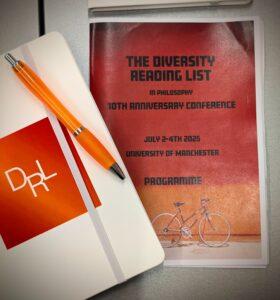 In July, we celebrated 10 years of the DRL with an excellent 2.5-day conference in Manchester. We were extremely happy to be able to host so many excellent speakers and facilitate really interesting discussions ranging from the topics of motherhood and queer discrimination, through highlighting the contributions of philosophers previously written out of history and the role of language in philosophising, to a number of practical recommendations for curriculum and research diversification. You can find recordings from those sessions on our YouTube Channel – check them out!
In July, we celebrated 10 years of the DRL with an excellent 2.5-day conference in Manchester. We were extremely happy to be able to host so many excellent speakers and facilitate really interesting discussions ranging from the topics of motherhood and queer discrimination, through highlighting the contributions of philosophers previously written out of history and the role of language in philosophising, to a number of practical recommendations for curriculum and research diversification. You can find recordings from those sessions on our YouTube Channel – check them out!The conference was also an excellent opportunity for the DRL Team to meet. We were very happy to see so many of our past and present volunteers and collaborators to join us there and celebrate our joint achievement. Once again – huge thanks to all of you for your amazing work!
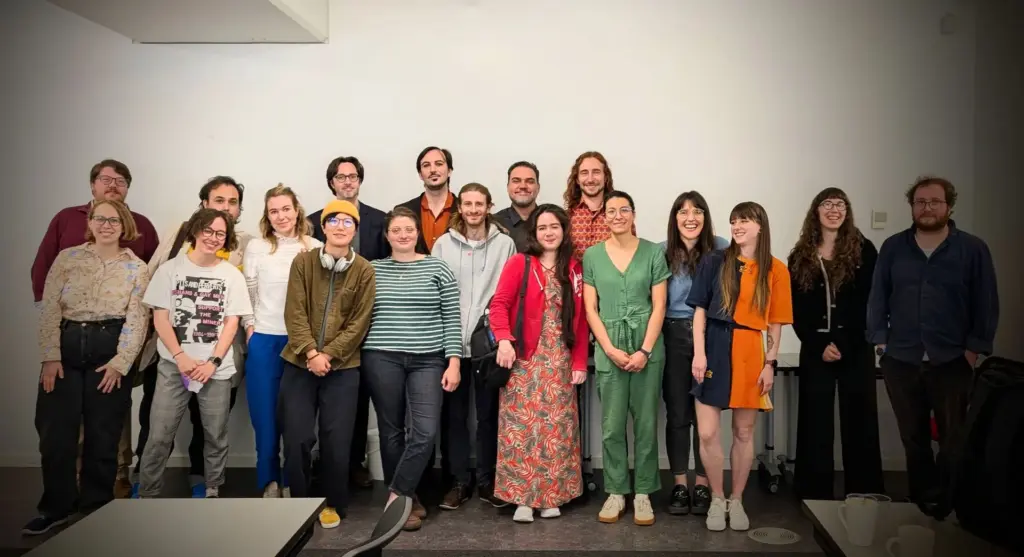
Recategorisation complete
At the Anniversary Conference, we made a great reveal – our project to re-categorise philosophy in a fair and inclusive key is complete! We are very proud to have updated the DRL website with a proof-of-concept system which aims to be inclusive by default, inspiring you to find and engage with scholarship from a wider range of traditions. You can read all about our new system on the info page we put together. And you can try it out simply by using the list, browsing through the new Topic categories, finding entries by Keyword or Figure, or filtering search results using by Topic, Tradition, Language and Time. We hope that you find our new system useful and we are looking forward to your feedback!
In the meantime, we will aim to promote this new approach with other resources, using the DRL as a proof of concept which might inspire to also adopt more inclusive ways of categorising philosophy.
New Editors
Following the creation of new Topic categories, we have now recruited a number of new Editors to help us manage those new topics. We were really surprised by how many applications we received – thank you so much for your interest and engagement! After much deliberation, we welcome to our team Veronica Cibotaru and Ravi Thakral (Philosophy of Language), Alnica Visser (Philosophy of Mind), Henry Krahn (Political Philosophy), Zoé Grange-Marczak (Phenomenology) and Alex Thinius (Social Philosophy). It’s great to see the DRL family grow!
We are still interviewing more applicants and would like to invite people who might want to take over Tradition-specific editorships. If this is something you would like to do, please get in touch!
Volunteer Spotlight: Lucija Duda (she, her)
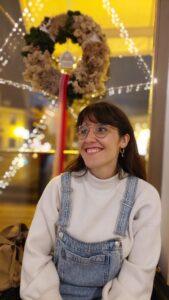
I am a soon-to-be PhD graduate from the University of Manchester. I work on feminist philosophy and metaphilosophy. I am interested in the resistant writing and speaking practices that allow marginalised philosophers to inscribe their selves into the philosophical text and speech. I examine what these practices reveal about philosophical style, the boundaries of philosophy, and silencing in professional philosophy.
I joined the DRL as a volunteer to organise the DRL Anniversary Conference. Together with Joseph Bentley and Justina Beršktyė, as Manchester-based volunteers, we ensured that this exciting event ran smoothly from our end. From dealing with more formal and bureaucratic things to helping with the search for potential speakers, it was an overall great and enriching experience. The most rewarding aspect was being part of a community that continuously works towards decentralising and decolonising the Western canon through various educational initiatives, metaphilosophical approaches, and works dedicated to issues of importance to marginalised and underrepresented groups in philosophy. It was very inspiring to exchange knowledge with all the speakers and other DRL volunteers, support each other’s work, and explore new ways to improve philosophy for the better. I look forward to exploring more volunteering opportunities with the DRL.
Get involved, get funded!
We continuously expand our list and you can help us by contributing content via our contribution page.
We couldn’t do what we do without the help of our fantastic volunteers. Check out our Volunteer Page to find out more, and join the Team! There are so many ways to get involved: creating new Reading Group Blueprints; becoming an editor; adding new list entries; organising events, promoting, and much more.
As a volunteer, you will also have access to the funding we receive for various projects we run. Get in touch to find out more!
Thanks so much again for all your support,
The DRL Team
-
Expand entry
-
We have some big news for you. Have you heard already? The DRL is 10 years old! And in exactly one month we are hosting a two-and-a-half day conference in Manchester to celebrate. The conference is free to attend both in person and online, and you can register on our website.
Here is all you need to know to join us in person or online, promote your own diversity-related project with us, or to watch our content online.
About the conference
Since 2015, the DRL has aimed to make philosophy more inclusive, diverse, and to promote equality of opportunity in our discipline. Racial and gender disparities in philosophy are significant, and if you are not a white cisgendered man, you are still likely to belong to a group which is significantly under-represented in contemporary Anglophone philosophy. But the landscape has been changing over the last decade and we are proud to have been a part of that change. It that time, the DRL aimed to address inequalities in representation by helping to overcome their cause: the stereotype of a philosopher as a white male. We continue to do so by making it easier for lecturers to find high quality texts written by authors from under-represented groups, by helping students set up reading groups on a diverse range of topics, and by popularising and conducting own original research into the state of the discipline.
At this two-and-a-half-day conference, we would like to celebrate the progress of the last decade and discuss what remains to be done; to bring together academics working on themes relevant to the DRL’s mission, and to make work by authors from under-represented groups more visible in university education and research.
If you wish to help us advertise the conference, please download our poster and hang it in your department!
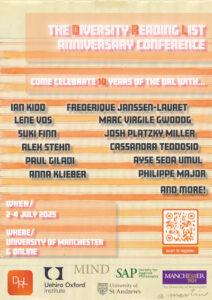
Call for Friends and Family
We would love to take the opportunity and amplify the excellent work done by other diversity projects in philosophy and elsewhere. If you are part of such a project, you can:
- Send us your posters and/or leaflets. We will be happy to display them and even print them for you.
- Send us a short description of your project we could print in our conference booklet.
- Join us in person to present your project at a poster session.
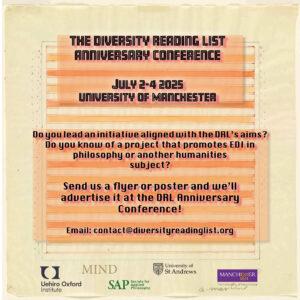
Programme:
- Alex Stehn (Texas Rio Grande Valley): “Pluralizing Philosophical Languages and Cultures”
- Anna Kleiber (Cardiff): “Silence under Oppression”
- Ayşe Seda Umul (Bilkent University): “Structural Gaslighting and Epistemic Oppression: The Marginalisation of Queer Identities in Patriarchal Societies”
- Cassandra Teodosio (Women Doing Philosophy, UP Diliman): “The Experience of Women Doing Philosophy in the Philippines: Voices and Writings from the Peripheries”
- Clotilde Torregrossa, Quentin Pharr, Simon Fokt (St Andrews/Berlin): “Categorising Philosophy in a new key”
- Frederique Janssen-Lauret (Manchester): TBA
- Ian Kidd (Nottingham): TBA
- Josh Platzky Miller (Witwatersrand): “Legitimacy Debates, the myth of ‘Western Philosophy’, and the Contribution of Ben Kies”
- Lene Vos (Utrecht): “Gabrielle Suchon and Mary Astell on the authority, education and liberty of women”
- Marc Virgile Gwodog (Douala): “Zara Yaqob and Walda Heywat on Gender Equality: Does Sexual Pleasure Matter to Equality?”
- Paul Giladi (SOAS): “Being Epistemically Disobedient: Reflecting on Co-Creating the SOAS Decolonising Philosophy Toolkit and Handbook”
- Philippe Major (Lancaster): “Structural Eurocentrism in Philosophy: An Argument for Sociometaphilosophy”
- Suki Finn (Royal Holloway): “Gender and Reproduction in Philosophy”
Location and participation
2 July – 4 July 2025, University of Manchester.
University Place; Rooms 5.206 & 5.207; 176 Oxford Street, M13 9PL
The rooms are fully accessible. For more see access guide for room 5.206 & 5.207The DRL Anniversary Conference is free to attend both in person and online. Register using the form provided.
For any questions, write to contact@diversityreadinglist.org
DRL adheres to the BPA/SWIP Good Practice Guide for Conferences.
We are looking forward to seeing you soon!
-
Expand entry
-
As the new semesters begin or are about to begin, we’re here for you with a fresh batch of news from the Diversity Reading List!
News
The Categorisation Project is under way
Over the last months we have been working hard on implementing the concept for indexing philosophy we presented in Fokt, Pharr, Torregrossa 2023. The project is led by Quentin Pharr and generously funded by the APA and the University of St Andrews, with further support from the Marc Sanders Foundation. We are hoping to have a test version ready in the coming weeks and to release the final version by the end of the year.Three new Blueprints!
We have fantastic news for all those wanting to explore different aspects of Philosophy of Mind. Thanks to the APA Small Grant, we were able to create three more fantastic Reading Group Blueprints for you! Check out our Blueprints page to explore a 7-week long group on Chinese Philosophy of Mind (by Xintong Wei), an 8-week long one on Feminist Philosophy of Mind (by Adriana Alcaraz Sánchez and Jodie Russell), and a whooping 11-week long one titled Mind, cognition, and the self. An embodied perspective (by María Jimena Clavel Vázquez, featured in our last Newsletter). This brings our total number of Blueprints to 20!Short Survey on Epistemic Challenges Faced by Native and Non-native English Speakers in Philosophy
Anna Klieber, a long-time DRL volunteer featured in our November 2019 Newsletter, is part of a team conducting an exciting study aiming to quantify and compare the epistemic challenges faced by native and non-native English speakers in philosophy. Their international survey targets anyone who has studied or is currently studying or doing research in philosophy. The survey will gather information on, for example, the time required to read, write, or understand a philosophy article or presentation in English.Whether you are a native or non-native speaker, your participation would be invaluable in helping us better understand this important issue. The survey takes less than 15 minutes to complete, will not collect information that allows you to be directly identified, and has received ethics approval from Utrecht University (Netherlands). We are also happy to share the results with participants who are interested in using the data for their own research.
You can access the survey here and email with any questions.Big plans for our 10th Anniversary!
2025 will mark the 10th anniversary of DRL’s existence and we would like to celebrate it by organising a conference dedicated to celebrating the various efforts and projects dedicated to making philosophy a discipline of equal opportunity. So far, we are in early planning stages, but are happy to share that the conference is likely to take place at the University of Manchester in early summer 2025, and feature both research papers as well as presentations from the various projects dedicated to the cause. We hope it will provide you with an excellent opportunity to better understand the challenges we are still facing and learn about the various methods and resources available to us. We will be back with more info soon!Volunteer Spotlight: Lea Cantor (she, her)

I am a Research Fellow in Philosophy at the University of Cambridge. I specialize in classical Chinese philosophy (especially Daoism) and ancient Greek and Roman philosophy (especially early Greek philosophy and Hellenistic scepticism). Some of my work has also covered aspects of the European reception of ancient Chinese and Greek philosophy and early modern Ethiopian philosophy. More generally, I am interested in broad narratives in the historiography of philosophy and how these shape specialist research in the history of philosophy, often in unexpected ways.
During my studies at Cambridge and then Oxford, I founded Philiminality, a student-run platform for cross-cultural and interdisciplinary philosophy, which seeks to promote more inclusive approaches to philosophy through academic conferences, reading groups, talks, and mentoring schemes. I am grateful for the chance to pursue this kind of work with the DRL, focusing particularly on making research by authors from under-represented groups more visible in university education.
I joined the DRL team last year as the Editor for Ancient Greek and Roman philosophy and Chinese philosophy. Though I have not been involved in the DRL’s recategorization project, I am especially excited about its upcoming launch. This trailblazing project radically reimagines how philosophy and its history might be classified and organized with a view to fostering more globally inclusive approaches to the discipline. I look forward to seeing the DRL’s team of volunteers and users experiment with this ambitiously novel framework.
Get involved, get funded!
We continuously expand our list and you can help us by contributing content via our contribution page.
We couldn’t do what we do without the help of our fantastic volunteers. Check out our Volunteer Page to find out more, and join the Team! There are so many ways to get involved: creating new Reading Group Blueprints; becoming an editor; adding new list entries; organising events, promoting, and much more.
As a volunteer, you will also have access to the funding we receive for various projects we run. Get in touch to find out more!
Thanks so much again for all your support,
The DRL Team
-
Expand entry
-
Do you also catch yourself thinking the new year has just started but it’s already March? Fortunately, we’ve been quite busy in that time and are happy to tell you all about it!
News
Seminar Series on Women in Nineteenth Century Philosophy
We are excited to invite you to a DRL research seminar series on Women in Nineteenth Century Philosophy organised by Alison Stone (Lancaster, featured in our August 2019 Newsletter), under the patronage of the British Philosophical Association and the British Postgraduate Philosophy Association. The series draws together scholarship rediscovering women philosophers from nineteenth-century Britain who have been unjustly left out of the philosophical canon. The talks introduce these women and their thinking on such topics as feminism, animals, metaphysics, religion, science and Darwinism.
The first talk will take place online on March 20th. You can find more details, sign up, and join the via our Event page.
APA and St Andrews funding for new Blueprints and the Categorisation Project
We are grateful to the APA for not just one but two Small Grants for two separate projects. The first will focus on developing a series of new Blueprints focused on different aspects of Philosophy of Mind, overseen by Jimena Clavel (featured below). The other is tied with our past research on how philosophy is systematised in indexes such as PhilPapers, and will focus on implementing the index concept we presented in Fokt, Pharr, Torregrossa 2023. It will be overseen by Quentin Pharr and has already found further financial support from the University of St Andrews. Both projects have launched and we will update you on their development soon.
Call for Editors
We are once again opening a call for DRL Editors. Editing is not only a great way to be a part of making philosophy a discipline of equal opportunity – we will also sing your praises to everyone and put you first in line for any grant projects we run. We particularly welcome applications from people specialising in the following areas:
- Aesthetics
- African, Native American, Islamic, Indian, and other philosophical traditions
- Epistemology
- History of Western Philosophy
- Philosophy of Logic and Mathematics
- Philosophy of Science
You can find more information about Editing on our Volunteer page. Don’t hesitate to get in touch if you have questions or would like to express your interest!
Volunteer Spotlight: Jimena Clavel (she, her)

I’m a philosopher working on the intersection of Philosophy of Cognitive Science, Philosophy of Mind, and Phenomenology. I received my PhD from the St Andrews/Stirling Philosophy Graduate Programme in 2020. I work now at the philosophy department at Tilburg University as an assistant professor. Before coming to Tilburg, I was a visiting lecturer at the Philosophy Department of Tartu Ülikool (the University of Tartu), in Estonia. I am interested in situated approaches to cognition, in their notion of embodiment, and in what they can tell us about perception and imagination. My work has focused on the sensorimotor theory of perception. More generally, I draw on critical and feminist phenomenology to explore the different ways in which our cognitive faculties are impacted by our sociohistorical context.
I first collaborated with the DRL as part of the MAP chapter of the St Andrews and Stirling graduate programme, when we organized the workshop Creating Inclusive Classrooms in St Andrews. Ever since then, I’ve been interested in their work and I’ve used their resources to support my teaching. The index has been incredibly helpful. It has allowed me to identify and incorporate literature from experts who are so often not visible in our syllabi. Moreover, the commentaries and classifications allow me to select resources that are adequate to the different profiles of students I teach. More recently, I co-created a Blueprint on Mayan and Aztec philosophy of mind. I also joined the DRL volunteers team as the Editor for the Philosophy of Mind section. I am also part of a group of colleagues who recently secured funding from the APA to put together a collection of three blueprints focused on philosophy of mind.
Get involved, get funded!
We continuously expand our list and you can help us by contributing content via our contribution page.
We couldn’t do what we do without the help of our fantastic volunteers. Check out our Volunteer Page to find out more, and join the Team! There are so many ways to get involved: creating new Reading Group Blueprints; becoming an editor; adding new list entries; organising events, promoting, and much more.
As a volunteer, you will also have access to the funding we receive for various projects we run. Get in touch to find out more!
Thanks so much again for all your support,
The DRL Team
-
Expand entry
-
The DRL Team is aiming high again, embarking on a new exciting project to inspire positive change in the discipline. Read all about it and more below!
News
The Philosophy Categorisation Project and APA funding
Following our research on marginalisation in philosophy indexing systems (Fokt 2020) and our proposal for Indexing Philosophy in a Fair and Inclusive Key (Fokt, Pharr, Torregrossa 2023), we are now about to put our words into action and start work on developing a new indexing system for the DRL. We are extremely happy that the American Philosophical Association decided to support us in this endeavour, offering to fund us through their Small Grant fund. We will begin work in January and update you on the progress. We hope that the system we develop will serve as a proof of concept and inspire other philosophy databases.Continued support and dollar matching from the Marc Sanders Foundation
The very generous and brilliant folks at the Marc Sanders Foundation have voted to renew their support of the DRL for 2024! But it gets even better this time because every donation you make to the DRL will be dollar-matched by them, up to $2000! So if you give us $50, we get $100. It’s #DRLMaths! If you’d like to support us financially, it will go a long way to keeping us afloat!You can donate through our dedicated page on the MSF website. We will recognise personal contributions by listing your name on our official supporters list. It would be even better if you can convince your university to support us! We will be proud to recognise generously supporting institutions on our page. We also have a special offer, where we can deliver workshops and training sessions for them.
You can find all information about this one our Support Us page.
New Blueprints
There is a whole new fresh Reading Group Blueprint waiting for you! This rich resource offers a detailed introduction to Feminist Logic and has been compiled by our prolific Logic and Philosophy of Logic editor, Franci Mangraviti.We have a few more Blueprints in the pipeline, and some of them also generously supported by the APA! Expect to see them published in the coming months.
Volunteer Spotlight: Franci Mangraviti (she, her)
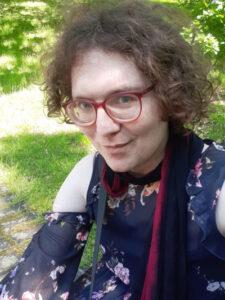 I am a mathematician-turned-philosopher. I specialize in logic and philosophy of mathematics but have been slowly branching out into social epistemology (especially matters of epistemic injustice) and philosophy of gender. My PhD work focused on making sense of a particular kind of nonclassical mathematical practices (so-called “inconsistent mathematics”) and culminated in providing a queerfeminist reconceptualization of the field. More generally, I am very interested in the ideas of alternative mathematics and feminist mathematics. My approach to these topics is practice-based, starting from what logicians and mathematicians actually seem to do, as opposed to what philosophers think they do or should do.
I am a mathematician-turned-philosopher. I specialize in logic and philosophy of mathematics but have been slowly branching out into social epistemology (especially matters of epistemic injustice) and philosophy of gender. My PhD work focused on making sense of a particular kind of nonclassical mathematical practices (so-called “inconsistent mathematics”) and culminated in providing a queerfeminist reconceptualization of the field. More generally, I am very interested in the ideas of alternative mathematics and feminist mathematics. My approach to these topics is practice-based, starting from what logicians and mathematicians actually seem to do, as opposed to what philosophers think they do or should do.I joined the DRL in March 2023 as an Editor for the “Logic and Philosophy of Logic” section. It has been a rewarding experience, as it pushed me to (and helped me) discover so much valuable work I may never have found otherwise. I take Logic to be a particularly crucial field to present a more diverse picture of, due to its alleged role as the very foundation of philosophy, its alleged neutrality making it very resistant to social and political scrutiny, and the disconnect between much philosophy of logic and actual logical practices. I have contributed over 40 entries, and many more are planned; furthermore, I have recently co-authored a blueprint on Feminist Logic, which I hope will help bridge the gap between two fields of philosophy whose interaction is far too often seen as blasphemous by students and professors alike.
Get involved, get funded!
We continuously expand our list and you can help us by contributing content via our contribution page.
We couldn’t do what we do without the help of our fantastic volunteers. Check out our Volunteer Page to find out more, and join the Team! There are so many ways to get involved: creating new Reading Group Blueprints; becoming an editor; adding new list entries; organising events, promoting, and much more.
As a volunteer, you will also have access to the funding we receive for various projects we run. Get in touch to find out more!
Thanks so much again for all your support,
The DRL Team
-
Expand entry
-
We have delayed this Newsletter a little because we were waiting for some big news. And we are very excited to report them to you now!
News
Marc Sanders Foundation Funding
We’re beyond excited to share that the Marc Sanders Foundation is now supporting the DRL! Check out our dedicated page on their website. With their help, we’ll be able to offer stipends to our Managers and Editors for all the work they do behind the scenes to add/edit entries and provide all the important content on the List. And thus, we’re excited to announce that we will be extending $500 stipends to:- Clotilde Torregrossa (Manager)
- Christopher Masterman Editor: Metaphysics)
- Deryn Mair Thomas (Editor: Social and Political Philosophy)
- Franci Mangraviti (Editor: Logic)
If you would like to join our Editor Team, and especially if you specialise in: Philosophy of Language, Philosophical Traditions, or History of Philosophy, simply write us to apply. More details in a previous newsletter.
We are opening up a donation system
It gets better! The Marc Sanders Foundation will also manage a donations system for the DRL, inviting individuals and institutions to support us. This is a potential game-changer for us, as it could provide us with a stable source of funds to cover our expenses and pay those who do excellent work on continuously expanding the List.We would be most grateful if you’d like to offer a personal donation and we will recognise your contribution by listing your name on our official supporters list. It would be even better if you can convince your university to support us. We will be proud to recognise generously supporting institutions on our page. We also have a special offer, where we can deliver workshops and training sessions for them.
You can find all information about this one our new Support Us page.
New Research Seminar Series
We are planning yet another DRL Online Research Seminar Series for you. This time, the focus will be on history of philosophy and 19th century women philosophers from Britain in particular. The seminar will be organised by Alison Stone (Lancaster) and include four speakers: Sarah Scott (Manhattan College), Sue Brown (independent scholar, London), Clare Stainthorp (Queen Mary), and Emily Thomas (Durham). We are planning to hold it in the Spring of 2024 and will update you when we have more details. For now, you can check out information about our past events on our Events Page and watch past talks on our YouTube channel.Volunteer Spotlight: Deryn Mair Thomas (she, her, they)
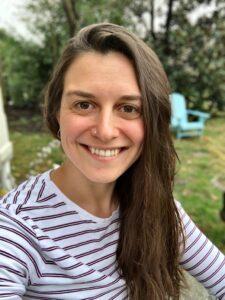
I am a recent PhD graduate from the University of St. Andrews, where I worked on (among other things) the concept and social value of work. More generally, I am interested in philosophical inquiry which seeks to understand the nature of public life, the processes of political deliberation, the practical demands of social cooperation, and the moral limitations of markets. As a volunteer for the DRL, I co-authored a blueprint – Reclaiming the System: New Visions for a Future of Work – which explores a wider range of philosophical perspectives and ideological alternatives to our current systems of work and employment than have traditionally been considered by Western academic philosophy. I have also served as the Social and Political Philosophy editor since February.
My work for the DRL has been both personally and intellectually enriching, and I see the DRL as an incredibly valuable resource for academic philosophy. On the one hand, it facilitates a new path forward for philosophical education and research, by providing alternatives to the standard canon and making those alternatives easily accessible to students, educators, and researchers alike. On the other hand, it contributes to the building of an important social network, by bringing people together who share a new, more diverse and inclusive vision for the future of philosophy. I have thoroughly enjoyed becoming a member of this community, as it has given me a way participate in that network and contribute to this vision.
Get involved, get funded!
We continuously expand our list and you can help us by contributing content via our contribution page.
We couldn’t do what we do without the help of our fantastic volunteers. Check out our Volunteer Page to find out more, and join the Team! There are so many ways to get involved: creating new Reading Group Blueprints; becoming an editor; adding new list entries; organising events, promoting, and much more.
As a volunteer, you will also have access to the funding we receive for various projects we run. Get in touch to find out more!
Thanks so much again for all your support,
The DRL Team
-
Expand entry
-
We have delayed this newsletter by a few weeks, because we were waiting for news about a paper that just came out, and a reading group that’s being organised. We share the news below, but first:
Please welcome our new Editors!
Last time we invited you to volunteer for the DRL as an editor, and we are now happy to announce the names of those of you who decided to reply, as well as those who collaborated with us already and decided to take on the new role. Our new editors are:
- Jimena Clavel (Philosophy of Mind)
- Andrés Hernández (History of Philosophy)
- Franci Mangraviti (Logic)
- Christopher Masterman (Metaphysics)
- Quentin Pharr (Epistemology)
- Fenner Tanswell (Philosophy of Mathematics)
- Deryn Thomas (Social and Political Philosophy)
- Colin Troesken (Aesthetics)
If you are interested in joining our Editor Team, we are still looking for people working in other areas, especially: Moral Philosophy, Philosophy of Language, Philosophical Traditions and History of Philosophy. You can find more details in the previous newsletter, and write us directly to apply.
News
Indexing Philosophy – in a Fair and Inclusive Key
The DRL team members are delving deeper and deeper into researching diversity-related topics. In 2020, Simon Fokt wrote a critique of existing systems for indexing philosophy, on the example of the PhilPapers category tree. He now teamed up with Quentin Pharr and Clotilde Torregrossa to write a positive proposal for a category system which would be more inclusive and fair, yet remain efficient and easy to use and implement. The paper will be published in the upcoming issue of the Journal of the American Philosophical Association, and you can read it online already now.Decolonise your reading groups initiative
We are very happy to report that our Reading Group Blueprints will be used in a joint initiative by the British and Irish Postgraduate Philosophy Association (BIPPA) and the Minorities and Philosophy UK chapter (MAP UK). They aim to organise a fortnightly series of online reading groups open to anyone interested, anywhere in the world. The first reading cycle follow our Postcolonial Theory, Race and Caste Blueprint and will begin in March 2023. The precise date will be announced according to the participants’ availability. Sign up here!New Blueprints & your feedback
Speaking of, we have two amazing new Reading Group Blueprints for you: Feminist philosophy and experimental philosophy created by Shannon Brick, Michael Greer and Tomasz Zyglewicz, and A Comparative Introduction to the Philosophy of Non-Human Animals by Björn Freter. We hope that you will find them interesting.It’s now a year since we started the Blueprints initiative and we are curious how you are finding them, whether you are using them to run a reading group, help you design a course, or just to explore a topic yourself. We would appreciate it if you could let us know using this short form. Thank you!
Re-reading the Canon with the Diversity Reading List in Philosophy
We warmly invite you to an open lecture Clotilde Torregrossa (St Andrews, DRL Manager) was invited to give at the SOAS University of London, on March 23rd, 2023, 2-4pm (London Time), as part of a lecture series on Re-Reading the Western Canon. New perspectives on ignored problems. You can register in advance here.Volunteer Spotlight: Julia Costet (she, her)
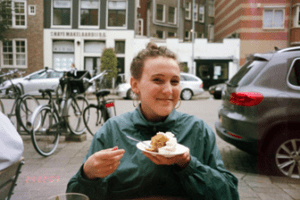
I am a third-year Ph.D. candidate at the London School of Economics’ Department of Government and have been a volunteer for the DRL for just over a year. With the DRL I co-convened, with my colleague and friend Suddhasatwa Guharoy (University of Manchester), a seminar entitled “Rethinking Ecofeminism: Creative Resistance and Environmental Justice”. The seminar gathered activists and academics to discuss ecofeminist ideas; whether they should or can have a future in informing our practices of resistance and our thinking about environmental justice.
As a feminist theorist working at the intersection of political theory, epistemology and phenomenology – I consider the work being done by the DRL to be really valuable in thinking about the practice of inclusion while we attempt to de-center the Euro-American canon. The DRL not only offers sources to diversify curricula but also offers practical strategies to engage thoughtfully and meaningfully with differently situated lifeworlds. My experience working as a volunteer for the DRL has been extremely positive and enriching. Through the vast network of the DRL, I have been able to meet engaged thinkers across the globe who are all working towards reflecting beyond the bounds of the canon. The conversations I have had with each of these engaged thinkers have greatly energized my own thinking and research!
Get involved, get funded!
We continuously expand our list and you can help us by contributing content via our contribution page.
We couldn’t do what we do without the help of our fantastic volunteers. Check out our Volunteer Page to find out more, and join the Team! There are so many ways to get involved: creating new Reading Group Blueprints; becoming an editor; adding new list entries; organising events, promoting, and much more.
As a volunteer, you will also have access to the funding we receive for various projects we run. Get in touch to find out more!
Thanks so much again for all your support,
The DRL Team
-
Expand entry
-
As the year comes to an end, we have some exciting news for you. Most importantly, we are changing how volunteering for the DRL works, and thus want to invite you to join us and become one of our Editors!
Call for Editors
The Editor role is the most prestigious role in the DRL. Taking it on shows a continued commitment to improving the discipline and growing your own teaching and research experience, and can become a valuable point on your CV.
As an Editor, you will be responsible for maintaining categories corresponding to your AOS. Normally you would take on the role for a year with an option to extend. To apply, you must have at least one year of teaching experience.
The job has two components:
- Editing entries contributed by other volunteers and the public, and generally maintaining your category by spotting problems, suggesting improvements, and so on.
- Adding new entries (recommended: 10 / year) and/or expanding existing stub entries (recommended: 20 / year). This might seem like a very small number, but we realise that it can be hard to fit this additional job in between other responsibilities.
The benefits of taking on the role are:
- You are first in line for any grants we receive that match your AOS
- Your name listed on the DRL site as an Editor (Past Editor once you step down)
- Your name listed by every entry you add or edit
- Improve your research and teaching by exploring new readings in your AOS
Workload: up to 5h per month, spread out to match your availability.
If you are interested, please get in touch now. Please also forward this note to anyone you think might be interested.
News
Seminar on EcoFeminism
Last month we hosted an online seminar titled: Creative Resistance and Environmental Justice: Rethinking Ecofeminism. It was a great event, including talks by Manisha Rao (University of Mumbai), Christa Wichterich (University of Kassel), Lori Gruen (Wesleyan) and Nicole Seymour (California State University). You can find the details of all the talks on our Events page, and watch the recordings on our YouTube channel. Huge thanks to Suddhasatwa Guharoy (featured below) and Julia Costet for organising!
Feminist Philosophy of Mind reading group
Some of our volunteers are currently preparing a new Reading Group Blueprint based on an anthology edited by Keya Maitra and Jennifer McWeeny. They decided to try things the other way: first run a reading group and construct a Blueprint on its basis. The group is hosted in Glasgow but meets online every other Wednesday – and you can still join! You can find the details on our Events page, or register directly here.
A new Volunteering page
Would like to volunteer for us but don’t know what to expect? We just put together a new Volunteer Page which can offer you some insight into what it is like to join the DRL Team, including testimonials by our existing volunteers. Please check it out and share it widely and help us expand our Team!
Volunteer Spotlight: Suddhasatwa Guharoy (he, him)

I am a final year PhD student at the University of Manchester and have been volunteering for the DRL for over a year now. In that time, I have co-authored a Blueprint on Post-Colonial Theory, Race and Caste and recently co-organised a seminar on Creative Resistance and Feminist Ecologies.
The administrative support offered by the DRL is great and really helped me with both the blueprint and the event. Both of these experiences have intellectually enriched me. What I find most important, is that the DRL provides the right platform for philosophy to engage with issues outside the ambit of what is assumed to be the usual concerns of the Anglophone canon. I am very satisfied as a volunteer, and I am sure people will find the DRL content stimulating.
Get involved, get funded!
We continuously expand our list and you can help us by contributing content via our contribution page.
We couldn’t do what we do without the help of our fantastic volunteers. Check out our Volunteer Page to find out more, and join the Team! There are so many ways to get involved: creating new Reading Group Blueprints; becoming an editor; adding new list entries; organising events, promoting, and much more.
As a volunteer, you will also have access to the funding we receive for various projects we run. Get in touch to find out more!
Thanks so much again for all your support,
The DRL Team
-
Expand entry
-
Over the last months, the DRL Team has spent a lot of time building on the strong projects we developed last year, bringing you more Blueprints and more live events. Read about them and more below:
News
New Reading Group Blueprints
We are about to expand our initial set of Reading Group Blueprints. Check them out to learn more about immoral statues and monuments, class or race in aesthetics, delve into pre-Hispanic philosophy of mind, or explore the human aspect of logic and mathematics. Three of the five new Blueprints were generously funded by the British Society for Aesthetics. We will announce the release on our social media later this month, and if you have an idea for a Blueprint focused on one of the topics suggested by our research and would like to join our team, have a look at the guidelines we compiled and get in touch!
Blueprints in use
Have you been using one of our Blueprints to run a reading group? We have some first reports from the University of St Andrews where the students ran the Sex, What Is It Good For? group. Here is what they say: ‘The readings […] were without deviation interesting, accessible, contemporary, [and] helped to cement in my mind that sex is a philosophically rich and perhaps unaddressed topic, one with more nuances then I had previously considered or realised.’
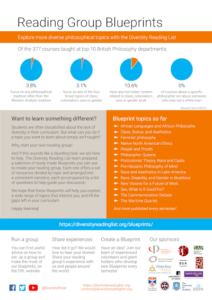
We are looking forward to seeing more groups starting around the world and invite you to promote the idea with your students, colleagues and friends!
Help us promote!
Would you like to see more reading groups inspired by our Blueprints starting around the world? Help us promote them by hanging our new promo poster on your department notice board!
DRL diversity and inclusion training
We have been invited to lead a diversity training workshop at the Scottish Graduate School for Arts and Humanities 2022 summer school. Following that event, we are planning to explore the possibility of delivering diversity and inclusion training at other events. If you are hosting an event which could benefit from including such a workshop, please get in touch.
DRL online workshop
Following on the success of last year’s seminar series, we are preparing to delve deeper into the world of live events. This autumn, we will be inviting you for a one-day online workshop organised by our fantastic volunteers, Julia Costet and Suddha Guharoy. The speakers, including Lori Gruen, Nicole Seymour and Elaine Nogueira Godsey, will explore the continuing relevance (or not) of ecofeminism to inform creative resistance practices and the way we imagine environmental justice. More updates coming soon on our social media.
Volunteer Spotlight: Ten-Herng Lai
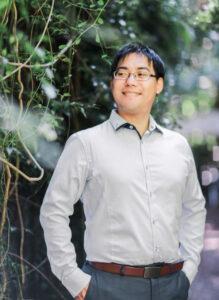
I’m a teaching specialist (fixed-term) at the University of Melbourne. I’m interested in what private actors may do about injustice. This has led me to work on illegal social movements, including civil disobedience and its uncivil counterparts, and more recently the debate on statues and monuments. Much of this is motivated by the recent social changes in my country of origin, Taiwan. We experienced a mass civil disobedience in 2014. We have a history of struggling against authoritarianism, and are currently in the process of transitional justice. The latter includes confronting political symbols established by past dictators. I believe that our democratisation and political transformation are worth further philosophical attention and theorisation, and I have, in several of my published articles, drawn insight from Taiwan’s recent past.
My involvement with the DRL includes creating a recent Blueprint: The Commemoration Debate. It seems that the debate on statues and monuments, while not completely absent from the literature, has until quite recently received much less philosophical attention than it deserves. Statues and monuments of oppressors, both white and nonwhite, have been the targets of protests and vandalism for at least several decades. In light of the recent boom in the literature, it seems only apt that we have a reading list that focuses on this highly relevant ongoing debate. I believe that it is fitting that this reading list includes authors from different genders, from diverse cultural and linguistic backgrounds, and covers examples from different countries. I contend that, in addition to helping us understand and come to have a better moral judgement on pressing moral, social, and political controversies, social and political philosophy that is informed by a wide range of lived experiences and struggles can enrich mainstream political philosophy.
Get involved, get funded!
We continuously expand our list and you can help us by contributing papers via our contribution page.
We couldn’t do what we do without the help of our fantastic volunteers. If you would like to join them and volunteer for us please get in touch! There are so many ways to get involved: creating new Reading Group Blueprints; adding new list entries; helping us with small one off jobs; becoming a regular editor; and promoting the DRL at events and online.
You might even be able to access funding to support your time working on the DRL. We’re keen to support any volunteers in getting this kind of funding. You can read more about this here.
Thanks so much again for all your support,
The DRL Team
-
Expand entry
-
With things moving at a faster pace, we are returning to quarterly newsletters to bring you all the updates from the world of diversity. Here is what we have been up to recently.
News
Reading Group Blueprints are out!
As planned, we have now released nine Reading Group Blueprints, allowing students to easily set up reading groups on topics not taught at their universities. The topics were selected based on Annie McCallion’s AHRC-funded research project – you can read a report from her analysis of the curricula from the top 10 UK departments right here. We are thankful to AHRC, the Future of Work and Income Research Network, the Centre for Ethics, Philosophy and Public Affairs and the School of Philosophical, Anthropological and Film Studies at St Andrews for their generous funding.
We are excited that one of our blueprints is already in use! The creators of Sex, What Is It Good For? are running a reading group at the University of St Andrews. We are looking forward to seeing more groups starting around the world and invite you to promote the idea with your students, colleagues and friends!
More Blueprints incoming
We are also already working on the next expansion to our Blueprints. We will be releasing a new batch in May/June, in time for the summer trimester on the northern hemisphere. If you would like to join our team and have an idea for a Blueprint focused on one of the topics suggested by our research, have a look at the guidelines we compiled and get in touch!
Our first Minorities and Philosophy rep
We are expanding our collaboration with MAP chapters by promoting a new role: DRL Reps. The idea is simple: a Rep is a member of a MAP chapter who collaborates closely with the DRL, developing joint initiatives such as local workshops or Contribution Drives, accessing local funding for collaborative projects, running groups using our Blueprints, and other initiatives developed to suit particular needs and opportunities. Our first Rep, Atul Satija (University of St Andrews), has joined us recently, and we are looking forward to inviting more students to take on this role at universities around the world!
Site updates
We have updated our About section to include new data published in the version of the BPA/SWIP UK report by Jenny Saul and Helen Beebee, and elsewhere. We are happy that we could contribute to the understanding of under-representation in teaching through Annie’s research and we are hoping to further expand on our knowledge of under-representation in philosophy by conducting similar research projects in the future.
One hundred contributors!
Early this year, we have breached the magic number! Over one hundred people have now contributed new content to the DRL. We would like to offer big thanks to all of our generous contributors, and to invite you all to do the same and send us more content for the list through our Contribution Page.
Volunteer Spotlight: Sara Peppe

I am a PhD researcher at the University of York currently working on probability in Quantum Mechanics (QM). Also, my current researches look at the theme of artificial intelligence in medicine. In particular, I am focusing on the deployment of artificial intelligence in healthcare, looking at the African context.
Before starting my PhD career at York, I was awarded a Masters degree at the University “Federico II” of Naples, in Italy.
My involvement with the Diversity Reading List can be traced back to 2018. I received an email from my department talking about the DRL. I was very interested in the project and wanted to leave a mark by becoming a volunteer. In this way, I started my volunteering activity as a contributor. I found it very rewarding. I felt that with my little contribution we were all moving forward towards a more inclusive academic environment.
After several years as an editorial assistant, I became the editor of the Diversity Reading List. Thus, I had the opportunity to become even more involved in the project. This year I helped launch our Blueprint project which aims to provide the necessary resources for study groups on philosophical traditions other than the Western Analytical one and feature themes often neglected in the UK philosophy departments. All together we made another little step forward in our journey towards inclusive philosophy.
Get involved, get funded!
We continuously expand our list and you can help us by contributing papers via our contribution page.
We couldn’t do what we do without the help of our fantastic volunteers. If you would like to join them and volunteer for us please get in touch! There are so many ways to get involved: creating new Reading Group Blueprints; adding new list entries; helping us with small one off jobs; becoming a regular editor; and promoting the DRL at events and online.
You might even be able to access funding to support your time working on the DRL. We’re keen to support any volunteers in getting this kind of funding. You can read more about this here.
Thanks so much again for all your support,
The DRL Team












